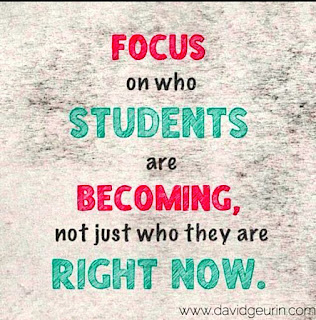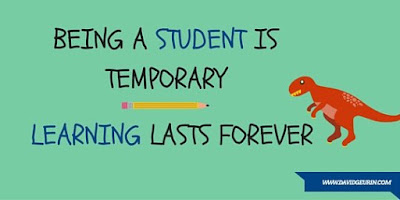The first priority in creating a positive classroom environment and limiting problem behaviors is to develop positive relationships. That's absolutely essential.
The second priority is to clearly establish expectations, for students and teachers. And that's a necessity also. Both teachers and students should know what to expect.
Building relationships and communicating expectations must be tended to daily. Both are critically important. We have to constantly build relationships and communicate expectations.
But what happens when things go off the tracks a little? How do you address those moments when it's not working well? The following are phrases I use when meeting with a student to work on a behavior concern. I gave a brief description of how and why I might use the phrase.
Set a Positive Tone
1. "I will never intentionally disrespect you."
This is one of my favorite phrases. I want kids to know I intend to show them respect. The implied message is I also expect you to show me respect.
2. "I believe in you."
Kids can't here this enough. It's important to establish positive intentions.
3. "I won't give up on you."
If a child feels you don't accept him or her, you aren't going to get their trust. Sometimes I even say, "I don't approve of what you did, but I will always accept you and be here to help you."
4. "Let's work together to solve this."
All of the problem-solving in working through an issue shouldn't come from the teacher. It's not me vs. you. It's us vs. the problem.
Address the Issue
5. "I was puzzled when you..."
Approach the situation with a sense of curiosity instead of approaching it with judgment, frustration, or anger.
6. "What do we do here when...."
Remind the student of the expectations. "What do we do here when it's time for bell work?" Then work with the student to verbalize the expectations.
7. "What should you have done differently?"
How did your behavior not meet the expectation? Help the student think through what behavior would have been acceptable in the situation.
8. "How did you intend for that to make ______________ feel?"
This is another one of my favorite questions. I often will use this to hold kids accountable if they do something disrespectful to me or someone else. "When you roll your eyes at me when I'm talking with you, how do you intend for that to make me feel? I care about you, and I feel sad or disappointed when you do that."
9. "How did you feel at the time?"
I also want kids to know I care how they are feeling and that feelings can be strong and make us want to do things we shouldn't do. But we are still responsible for our actions.
10. "That seemed upsetting to you."
Paraphrasing is important. Again, validate how the student is feeling but help them know they are still responsible for their actions.
11. "I hear what you are saying. I'm listening."
If you want to help deescalate a situation, make sure the person is feeling heard. Not feeling heard is a sure way to keep the two side apart.
12. "Is it possible that...?"
Help introduce new possibilities to the situation. Kids, and adults for that matter, can get locked into seeing a situation from only one perspective.
Decide on a Path Forward
13. "What should you do when ___________________?"
This questions can be helpful to brainstorm how the student could respond to certain triggers.
14. "What will you do next time?"
It's very important to get a plan that is future-focused. Too often, behavior is handled by just giving consequences. Punishments focus on the past. We want to build toward better future decisions, too.
15. "When will you do it?"
It's just another question to be very intentional about planning for next time. Looking for things like, "I'll do it the first time I'm asked."
16. "What do you need to do now to make this right?"
This question is very important. There may need to be an apology. There may need to be some other action right now to address the problem.
17. "Would you like to _________________ or ____________________?"
Choices are really good for providing some agency while also limiting behavior to acceptable options.
18. "Can I count on you to do that?"
This question is very important. After I discuss with a student the path forward, I will follow up with this one. I want to make sure they are fully committed to our agreement.
19. "Okay, but in case you don't, what do you think are fair consequences?"
The student also needs to consider there will be consequences if the agreement is broken.
Reflect on the Conversation
20. "What's your understanding of what we decided together?"
This question requires students to provide a summary of what was decided.
21. "Do you feel that you've been treated fairly?"
Students may not always be happy when we are finished dealing with an issue, but I want them to feel they have been treated with fairness and respect. If they leave feeling disrespected, it is not going to help them be ready to make changes in their behaviors.
I hope these questions are good reflection for you as you work with students and solve problems. But I want to hear from you. What questions would you add to this list? What are some of your best tips for dealing with difficult situations? Leave a comment below or respond on Twitter or Facebook.













